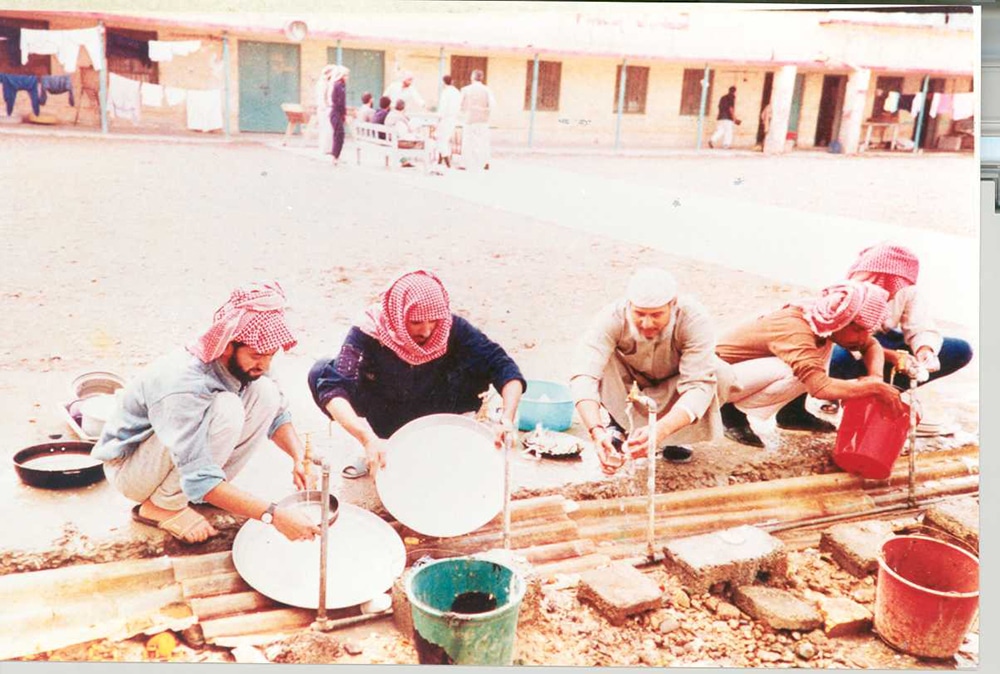By Faten Omar
 Kuwaiti POWs hang clothes in captivity.
Kuwaiti POWs hang clothes in captivity.The liberation of Kuwait from the Iraqi invasion in 1991 was a significant event for citizens and the Middle East. It was seen as a major victory for the coalition and a decisive defeat for Iraq. While everyone was celebrating, Kuwaiti prisoners of war in Iraq were waiting to leave the nightmare of the invasion behind. Kuwait Times spoke with former Kuwaiti POW Retired Staff Colonel Nasser Salmeen, who shared his experience as a prisoner during the Iraqi invasion.
Kuwait Times: How long were you in captivity?
Salmeen: I was captured on the first day of the Iraqi invasion, and was imprisoned for 238 days. The prisoners reached the Iraqi prison on Aug 3, 1990 and were released on March 27, 1991.
KT: Were you hopeful to return to Kuwait when you were in prison?
Salmeen: Hope was always with us. We believed that God will not abandon us. But of course, the pain and strength vary from person to person. But I think everyone was united in their belief that Kuwait will be liberated.
KT: What was it like in the Iraqi prison?
Salmeen: The period of imprisonment was very painful. We lived in pain and in a bad psychological state, which changed us in many ways. The most important thing for many of us was holding on until we returned home. With everything we did at the detention centers and prisons, we got closer to God because we were moving from prison to prison, but we were patient and endured severe psychological pain until we reached the liberation day of Kuwait.
KT: Tell us more about Kuwait’s liberation period.
Salmeen: We received the news of the liberation of Kuwait when we were in Baquba jail. We heard the news on the radio we smuggled into the jail during family visits. It was very difficult to hide it from Iraqi soldiers during inspection and counting. On Feb 26, we heard US President George Bush’s speech announcing that Kuwait was liberated with the words “Free Kuwait”. It was a historic moment and an indescribable feeling.
KT: When did you return to Kuwait?
Salmeen: We returned to Kuwait with the Red Cross on March 27, 1991. We heard on the night of the 26th that we would be transferred to the Iraqi-Saudi border. At the border, we were received by a delegation of senior army and police officers headed by Sheikh Ahmad Al-Hamoud. I felt for the first time that I was really free when I saw the Saudi flag flying over the center. I was reborn. The prisoner is born twice, on the day of actual birth and the day of his freedom.
 Retired Colonel Nasser Salmeen
Retired Colonel Nasser SalmeenKT: How did your family receive you?
Salmeen: My family, like all families, was waiting for me at Shaikhan Al-Farsi Hall in Surra. They were waiting for the fifth batch of liberated officers. My wife, Um Badr, came with my children and her brother to welcome me. I was on the last plane from Saudi Arabia to Kuwait. During the landing, we saw Kuwait covered in black due to the burning oilwells. When the plane landed, I was so thankful that I prayed and kissed the ground. I went home to Qadsiya and knocked on the door, but no one answered. I wondered where my wife and children were, and was worried something might have happened to my family. I was so tired that I sat on the stairs of the house and fell asleep. I woke up to the voice of my children. (It was a) feeling that I cannot forget - happiness mixed with tears of joy.
KT: Did spending time in Iraqi prison affect your mental health?
Salmeen: The period in which I was detained was a harsh period for all of us, especially for the prisoners. We had nightmares and were in a bad psychological state, even after being released. When I was sleeping at home with my family, I was afraid to open my eyes. My children would think that I was asleep but I was actually too afraid to open my eyes. I was afraid that I would open my eyes and find myself in prison in Iraq again and that everything that’s happened since had been a dream. Having my children around helped me through my painful psychological state. But sometimes when I sit with myself, memories come back to me and I remember the days of torture and interrogations as a prisoner of war in Iraq.











